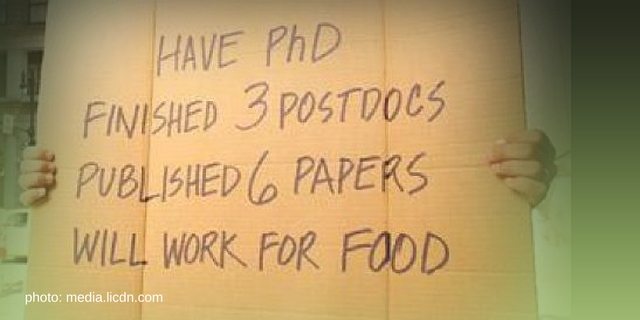A letter to U.S. Colleges and Universities:
Would you invest $60,000 U.S. dollars on a master’s degree knowing you might make less than $660 per month upon graduation?
The “Hyper educated Poor” is a new social phenomenon spanning all geographic borders. Whether in the U.S. or Asia, there are more college graduates that are either unemployed or underemployed. This disturbing trend has only worsened in recent years.
Here we profile two underemployed individuals with master’s degrees. What would your administration do if these graduates were from your school? Would you just sever ties as most schools do when they stop paying tuition? Should schools take any responsibility for not advising students that investing in them could lead to economic disaster?
Story 1: A Higher Educated Poor in Taiwan
An article published last week (April 4, 2015) on ChinaTimes.com reported on the life of a well-educated Taiwanese national who – although has a very busy work schedule – lives in abject poverty.
Ling-Ling is a 35-year-old Taiwanese female. She earns about $660 U.S. dollars per month working at Taiwan’s best hospital. This is in spite of the fact that she holds master’s degree in Therapy for Special Needs Children from a European university. She earns less than the minimum monthly salary mandated by Taiwan’s government in 2014.
Several years before Ling-Ling studied in Europe, she was making about $1,000 U.S. dollars per month with an undergraduate degree in business and liberal arts. After working for years without a pay increase, Ling-Ling decided to pursue an advanced degree in a highly needed yet less competitive field. But her European education was costly and nearly depleted her parents’ entire savings.
Clearly things have not worked out the way Ling-Ling and her parents had envisioned. They’ve poured all of their faith and money into an education venture they believed would pay dividends in the form of a better life. Unfortunately, Ling-Ling’s economic condition continues to deteriorate. Discounting inflation, she now works longer and harder for 60% of what she used to make just a few years ago.
Taking a look at Ling-Ling’s return on her $60,000.00 investment, it will take her about eight years just to break even on the principle. This is assuming, of course, that she doesn’t have to eat or pay her bills during this time. (The minimum monthly expenditure for a single person in Taipei, Taiwan was about $500 U.S. dollars in 2013.)
One might argue that she should have known better. But the same can be said about the college that recruited Ling-Ling and put their interests above hers. Rather than advise her properly of the high risk involved in pursuing this degree, they kept silent.
The low ROI on foreign degrees may explain why more than 60% of Taiwanese students now choose short-term study-abroad excursions over expensive and protracted degree programs.
According to an article published on Jan. 29, 2015 in World’s Magazine (Taiwan), the territory’s average monthly salary is below what it was 16 years ago. This puzzles many considering Taiwan’s competitiveness index comes close to that of South Korea’s. Yet Taiwan’s average salary is roughly 52% of what the average South Korean earns.
American college graduates are hurting as well. Forbes.com in August 2014 reported that the underemployed rate rises to 59% for people with master’s degrees. To add insult to injury, the Huffington Post reported in 2013 that half of all recent college graduates work in positions that don’t require a college degree. This begs the question “why bother?”
Story 2: Hyper Educated Poor in the U.S.
Take for example an article entitled “This college instructor has a Master’s degree and she’s still living in poverty” published on Jan. 11, 2015 by www.rawstory.com.
Bolin, 35, a mother of an 8-year-old disabled son, teaches composition as an adjunct professor at a college in Chicago. She earns $4,350 per course, and her annual income has never exceeded $24,000.00. At the time this article was published, Bolin had $55 in the bank and $3,000 in credit card debt. Although she stretches her dollar as best she can, she can only do so much with so little.
She believed a master’s degree would be her ticket to success and economic security. She never expected that she and her son would have to depend on government subsidies just to survive. Now she not only doubts the value of her degree, but she has also begun doubt the value of her very existence.
The article goes on to state that Bolin is not alone. “The number of people with graduate degrees receiving food assistance or other forms of federal aid nearly tripled between 2007 and 2010, according to the U.S. Census, “the article reports.
So, what’s wrong with this picture? The answer is plenty!
Like any other business, colleges and universities require a steady revenue stream to stay afloat. Unfortunately, it’s the students who pay the ultimate price in keeping these antiquated degree programs rolling.
Most schools effectively sever their relationships with students once they leave. This is particularly disturbing given that many schools have not adequately prepared their students to enter the job market. Aside from the obvious moral dilemma this poses, it’s bad business; especially for schools attempting to brand themselves in new territories.
If the adverse effects of “recruiting at all costs” placed on society are evident, then who is to be held accountable? Accountability begins with one’s self. Sadly, human beings harbor an amazing ability to justify anything we do. Having said that it’s incumbent upon us all to draw attention to flawed policies that harm society. This includes self-serving recruiting practices.
An industry’s success is dependent upon its ability to understand and ultimately fulfill its client’s needs. Education providers are no different. If we hope to be in business ten years from now, it’s imperative our curriculum prepares students with skills necessary to succeed. This may include providing students with technical skillsets, and the ability to converse well in more than one language.
From a business perspective, nothing can expand your school’s name better than a satisfied graduate. Ultimately word-of-Mouth remains your most powerful and cost-effective marketing tool.
(Excerpt from Access Education, LLC)


I like this article.
Thank you for your encouragement.
Sad stories. I hope it will get better when I finish my graduate studies.
Yes. We do hope the economy could be better than it is now.